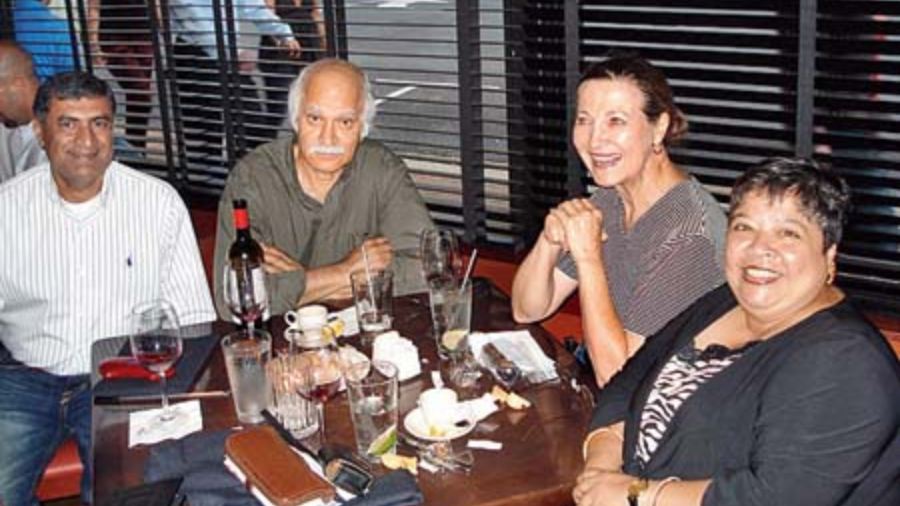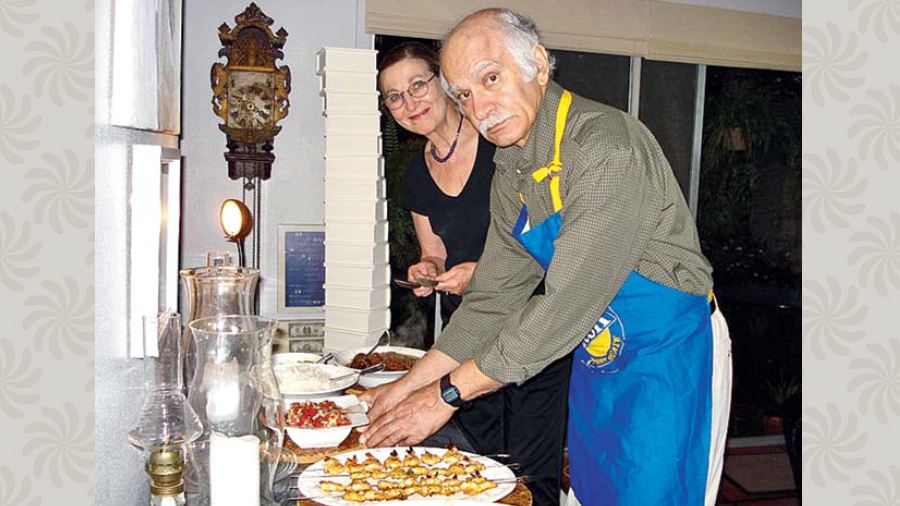The late Zulfikar Ghose was a prodigiously imaginative and prolific writer from Sialkot who made tracks in the UK and the US with his highly original sense of humour and a grasp over magical realism with epic style stories based in Latin America.
Some weeks ago, before Zulfikar Ghose took the last flight on his final journey out, he wrote me an email. He was planning to visit us in Kolkata, with his wife, the beautiful artist Helena de la Fontaine. Over 15 years we had built a friendship on the scaffolding of the love of literature. But mostly, it was his love for that inimitable French writer Marcel Proust that brought us close.
In that message he had said, with his characteristic warmth: “Most happy to have your Proustian note land like a dragonfly on my sunny brain. I wish we could visit you in Calcutta, a city that I much enjoyed visiting on my cricket reporting tour of India in 1961. But apart from the horrendous global pandemic that makes travelling impossible right now, another natural factor, old age, is a pestiferous hindrance.”
I realised just now, as I remembered that first meeting with him exactly 15 years ago as I walked into his office at the University of Texas at Austin on that blazing August afternoon, that we have lost an uncommon friend. And as I savour the rare and precious drops of wisdom of the meetings with him over the years, I find myself deeply moved by the gentle wealth of love that he left us.
In late February this year, as my partner, historian Harish, and I fretted over the unseasonal snowstorms that were blowing over Austin, and unsuccessfully tried to speak with him, he felt the telepathy, it would seem: “We’ve been housebound and snowbound for a week, enduring the worst winter storm in the history of Texas. I suppose it’s not much compared to what you must have experienced in Canada, except that there the country is prepared for a snowy winter while here it was already a flowery spring before the storm hit. However, we’ve managed well in our large house and hope to be back to normal by the weekend. People are very kind and helpful; only this afternoon I had a call from someone calling themselves the Desi Group who offered to bring us anything we poor desis needed and I told her we were well stocked with spices and were enjoying samosas and parathas.” Always understated, never seeking attention, his was a wry, understated sense of humour that embellished his life and his works.
In a postscript he added: “Naturally, I’ve been enjoying following the amazing cricket going on in India.”
Ghose grew up in Sialkot (now in Pakistan) and in Mumbai. He then moved with his family to England, where his father ran his own business. He graduated from Keele University, UK, and, in 1959, married Helena de la Fontaine, an artist from Brazil, a country where half his novels are set. He was a sports journalist, reporter, literary critic, novelist, creative writing professor and a cricket correspondent for the Observer.

(L-R) My partner Harish, Zulfikar Ghose, his wife Helena, and I at iconic Asian restaurant P.F. Chang’s in Texas, Austin
My doctoral supervisor at the University of Toronto, the late Chelva Kanaganayakam, a diasporic Sri Lankan Tamil with a reputation for being a formidable scholar of postcolonial South Asian literature in North America, had written his PhD thesis on Zulfikar Ghose’s writings. Knowing my keen interest in how magical realism is used as a tool by postcolonial novelists like Salman Rushdie, Gabriel Garcia Marquez and Zulfikar Ghose, he persuaded me to visit Zulf-ji at Austin. It was his nudging me incessantly to seek a visit with the Pakistan-born, diasporic British-American writer that initiated a remarkable friendship. In the summer of 2007, Harish had a research project at Lyndon Baines Johnson Library and Museum (LBJ Presidential Library) at Texas at Austin. It was a perfect opportunity to visit Texas. That was the summer my 86-year-old mother was diagnosed for dementia. Having spent some brutally difficult weeks in Kolkata, I flew into Austin, Texas, soul weary and in a state of internal dishevelment.
After a disoriented acculturation into Austin, I woke up with my partner gone to the LBJ Presidential Library. As I wound my way to Zulfikar Ghose’s office, where he taught creative writing, a tall, lean man with a strong clasp of my hand and an affable smile made me warmly welcome. Our conversation began with his perceptive observation: “You seem to have travelled a great distance to come and see me, much further than from Toronto. Chelva had said you are one of the most gregarious scholars. Why so quiet then?” The floodgates waiting to burst forth were opened and I spoke of my mother’s dementia.
Turning to Marquez’s One Hundred Years of Solitude, where an entire town of Macondo is stricken by the “infection” of forgetfulness, Zulf-ji spoke of the terror of dementia and how he was seized with the fear of being unable to remember when he became older. For three hours he spoke and he listened, and explained how the process of writing and using the imagination to create characters based in South America allowed him to tell the history of colonisation and resistance in his works of fiction.
With over a dozen novels and several books of poetry and essays to his credit — The Incredible Brazilians, A New History of Torments, Figures of Enchantment and many others — he was the most unpretentious celebrity writer I had met in all my years as a literary reviewer and interviewer for several Southeast Asian newspapers. By the time the Texan sky had worn its last blush before dusk, Zulf-ji had scheduled lunch and dinner with Harish (whom he was yet to meet) and I over the next few days.
The next week whizzed by being driven around in his yellow Mazda convertible, and taken to his hacienda-like home in the suburbs of hilly Austin. Some of the most memorable meals by the most gracious hosts, where he cooked up a storm with his artist wife Helena, and served up luscious grilled shrimp and kebabs with vintage red wines selected by him, are stamped on our minds. He and my partner Harish took to each other immediately and the passion for cricket and writing were the engines that drove their friendship over the past 15 years. “Shut that sliding glass door behind you, my girl, or the snakes might slither in,” he would remind me, with a wicked sense of humour.
Then two years later, in 2009, Chelva Kanaganayakam, the then director of the Centre for South Asian Studies at the University of Toronto, as well as the scholars there invited Zulf-ji as keynote speaker to a conference on South Asian literature, where novelist Manil Suri, poet Sheniz Janmohamed, Prasad Bidaye, Chelva Kanaganayakam and many young scholars of world literature and myself engaged with him on many issues of postcolonial identity and the idea of home.
Over the years, the conversations with Zulf-ji got more insightful and trust and mutual warmth led to some rare insights from him. On July 11, 2020, Harish emailed Zulf-ji saying, “I was wondering if you might do a piece on cricket and racism with an Asian ‘square cut’ thrown in. It would be an accurate Southeast Asian ‘Yorker’ if it appeared in the launch issue (of Rising Asia Journal) in September/October.”
On July 12, he replied: “That’s a fast bouncer you pitched and my immediate instinct was to duck. I’ve been resorting to the amber liquid since to stimulate the old brain under the dented helmet. Give me a couple more days to think about it and I’ll get back to you.”
On July 14, he wrote: “Harish Old Boy: You’ve won the toss. I’ve taken the field with my thoughts. It’s going to be a 5-day Test. I’ll post the result when it ends. Cheers, Zulf.” He sent the article on July 21, saying, “I can never predict what I’ll write and know it only after I’ve written it, and here is the article that has emerged out of my old brain thanks to your asking me to write one for your new journal. Julie has delighted Helena and me with her memories of our times together which we often talk about and wish we could renew. Much love to you both, Zulf.”
His article dealt with the idea that on the cricket field, English discrimination was not a case of racist bigotry as much as the old English obsession with class. But finding employment in England in the mid-Twentieth century, he recalled, was fraught with racial prejudice.
He was always enthusiastic and interested to know what the syllabi was in both the University of Toronto and Calcutta University. In one of my recent exchanges his candour as an academic and writer is unparalleled: “I have very little regard for (W.) Somerset Maugham. He was one of the writers the British foisted on us in the days of the Raj together with such other third-raters like (Rudyard) Kipling. Somerset MaughamSomerset Maugham. In those days we were meekly in awe of these “masters”. I’m sorry to be so blunt about this, but if your students want to read good 20th century English short stories, have a look at the work of Angela Carter. The best modern short stories were written by the South Americans — Machado de Assis, Jorge Luis Borges, Clarice Lispector, Maria Luisa Bombal — the Americans William Faulkner and Joyce Carol Oates, and I could add a few names from Europe.”
A couple of months ago, Zulfi-ji had stated to me like a soothsayer: “Well, here we are in America, dreaming of travelling to Brazil and to India, three countries where the pandemic is the worst in the world, giving humanity a foretaste of the eternal quarantine awaiting it in the afterlife.” How surreal are those words about our times!
Pictures courtesy of Julie Banerjee Mehta
Julie Banerjee Mehta is an author of Dance of Life and co-author of Strongman: The Extraordinary Life of Hun Sen. She taught World Literature and Postcolonial Literature for many years at the University of Toronto. She currently lives in Kolkataand teaches English at Loreto College
